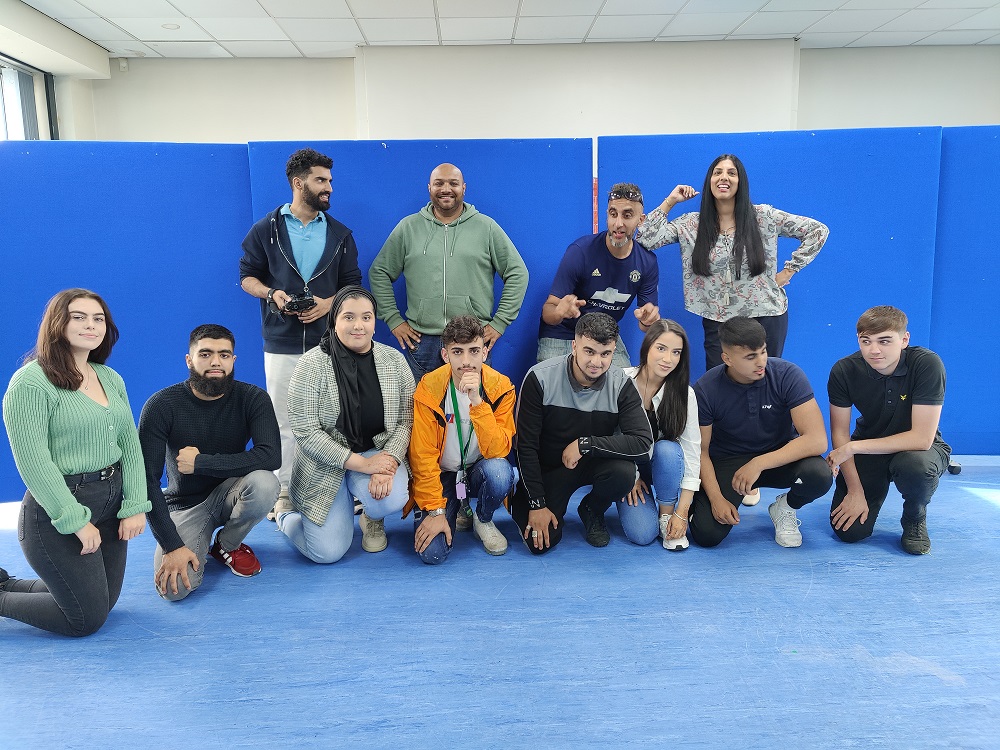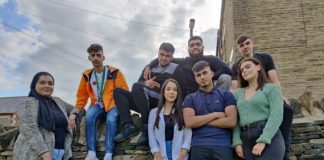A documentary highlighting the challenging experiences of young people in Bradford during the Covid-19 pandemic is to be released soon.
The Documentary called Young in Covid: The Silent Pandemic tells the moving stories of several young people from across different backgrounds in the city, who felt “invisible” and “forgotten about” during the various lockdowns. The film features the stories of Umaimah Siddique, Muhammed Ali Islam, Numan, Husnain Shafiq, Natalina Mudd, Harry Clayton, Marium Zumeer, Leo, and Arron, who offered up their raw, unfiltered emotions and thoughts on what it was like living through the Coronavirus pandemic in the most crucial stages of their life.
Bradford is Britain’s youngest city, with almost a quarter of the district’s 528,000 population under 16. The district also has a diverse population with people from ethnic minorities making up 36% of the population compared to 14% nationally. In Bradford schools, 153 languages are spoken by children.
The documentary was conceptualised by Sofia Buncy DL, co-founder, and national coordinator of the multi-award-winning Muslim Women in Prison programme. Sofia has fifteen years’ experience, in social and youth work and is based at the Khidmat Centres, two purpose-built community centres that deliver services primarily for vulnerable members of the community.
During the pandemic, where most people were shielding at home from the deadly virus, Ms Buncy was out in the community setting up food banks and hot food provisions for those in need, as well as campaigning on the risks of nitrous oxide, calling on the Government to crack down on “hippy crack” which has been plaguing Bradford’s streets.
“As a practitioner, I have my ear close to the ground, so I had already built close relationships, trust and familiarity with many young people in the district and those bonds became closer knit during the lockdown.” Ms Buncy said.
The Yorkshire woman noticed that people, especially young people, were not coping with lockdown and so along with the Khidmat centre’s youth ambassador, Umaimah Siddique, she set up online sessions with a youth group, to provide support during lockdown. Through the sessions, the award-winning practitioner could see young people were struggling and that’s when she and Umaimah became desperate to do something about it.

Ms Buncy said: “Once we initiated a conversation with young people, I could see they were bored and scared. Just talking to them I realised that they felt overlooked and ignored. I could see they were really struggling.
“So, Umaimah and I got talking – she asked me to do something. I didn’t want to write a report as it wouldn’t have a large reach, so I thought how do I get a large audience to address and understand the issues and that’s when the idea of the film came about.”
“The beauty in this film is that it is raw, that the young people have talked bravely on serious issues in their life, such as losing family members and friends. It is going to be a time capsule for how young people felt at the time, and I hope that we can look back on the video in a few years’ time and learn from it, I hope it gets shown in universities.”
The documentary took nine months in the making and was filmed between November 2020 and July 2021.
The powerful film captures issues of loneliness and isolation, poverty, exam stress, abusive households, exercising as a way of increasing positive mental health, suicide, and death.
Umaimah, who starred in the film and also helped Ms Buncy put the documentary together said: “During the pandemic, young people weren’t coping, which is what led us at the Khidmat Centres to make the video, to tell people what we have experienced and get our voices out there.
“Young people’s voices weren’t being heard, it was all about older people, but what about us? We experienced the same things everyone else went through – but there was no support.
“All we could see on the TV is the numbers go up and up, but it wasn’t explained to us. We didn’t know what was going on and that was frightening. They should have explained to us properly what was going on, it was like we were facing an invisible enemy.
“Me and my sisters were at home for quite a while and not knowing what was going on outside made my mental health worse. We weren’t in a routine, the schools were closed, nobody cared.
“Big community groups have been given so much money to help young people and we haven’t seen any of it, it is disgraceful. Grassroot organisations need funding to deliver services that young people want.”
Numan Aslam, of Great Horton, is one of the young men featured in the film. He was most worried about his future education and career prospects, with educational establishments closing down and shifting to online learning, and final grades being based on predictions, this created additional stress to an already stressful period in a young student’s life.
Numan said: “The pandemic was quite tough, there was a lot of mixed messages. It happened during my A-Levels, and there were lots of confusion and panic.
“It was confusing because I got results for A-Level exams that I didn’t sit and weren’t really based on anything. I was worried about getting into university. There weren’t any jobs to get either, other than in takeaways.
“I got into to university to do business and consultancy, with the first year supposed to be a blended learning approach of online and in-class learning but I only got to go on campus about ten times. Learning from home was difficult because I get distracted so easily. Luckily, I got help from the programme leader and I’m now going into my second year.”
Numan also mentions that it was touch-and-go with his brother’s apprenticeship. His brother who secured a lucrative apprenticeship doing mechanical and electrical engineering was put on furlough when the company he was working for temporarily halted and was worried that the company wouldn’t be able to afford to bring him back. Thankfully for Numan’s brother, was able to continue with his apprenticeship.
In the short film, we also get to hear the tragic story of Marium Zumeer and her father. The 19-year-old was hospitalised last May with covid and was in a medically induced coma due to the virus. Her mum and Baba (Grandfather) were also hospitalised at the same time. Sadly, Marium’s Baba passed away whilst she was in the hospital and wasn’t told until she got home.
Speaking to Asian Standard, Marium shared how she felt about participating in the film: “The experience of Covid feels like a blur, even a year later we’re still trying to understand what’s going on and how it is affecting us. Whether that’s mentally, socially, our jobs – everything. So, it was good to get out what happened and how I felt at the time it was happening, through this film.”
Marium is still struggling with long covid and feels she has lost a lot of her independence battling with the virus.
“I couldn’t do much by myself, I couldn’t even walk up the stairs.” She said.
Covid has really left an impact in Marium’s life, as not only is she continuing to deal with her health issues, but she is also grappling with bereavement.
“At the time I was in hospital, I knew my grandad was also brought in for Covid, my family didn’t make me aware that he had passed away, because they didn’t want me to feel upset or feel alone finding out such news.” Said Marium.
“I was still thinking I am leaving the hospital and I hope my grandad goes home next because in my mind he was still in hospital in the ward next to mine, but obviously once I got home, my family told me a couple of days after I had gone home, that he had passed away.”
There are many other voices in the film, and it also includes a subtle issue on the disparity between black and minority ethnic young people and the white participants of the documentary. Ms Buncy said: “The documentary is a collective piece of young people’s experience, and they are all comparative.
“However, through the film, you can see themes of disparity. For example, Natalina Mudd of Queensbury says in the video that she hasn’t had the Coronavirus and doesn’t know anybody who had, but Umaimah and her sisters all had it.”
One of the reasons for this is due to low-income households and multi-generational occupancy that is common in South Asian families in Bradford. People who were not able to work from home or couldn’t afford to shield themselves were more at risk of catching the virus than those who were able to isolate.
With a lot of time, effort, and emotion gone into creating the thirteen-and-a-half-minute documentary, Ms Buncy said: “Showing the video over Zoom or a different online platform would not do it justice, it needs to be showcased in-person. The documentary needs to get out there and be acknowledged. People need to see the video and realise that there is power in young people’s voices.
“I want to say thank you to Pishdaad Modaressi, the filmmaker who trusted my vision and bravely filmed the documentary during the pandemic, and our partners at Manningham Housing, West Yorkshire Police, Mary Magdalene CIC, Valicity Care Services, and Dixons Trinity Academy for supporting the documentary. Their support has been so encouraging, that they have trusted us and seen our vision, it is a testimony to the strengths of the organisations.”
The film will be launched at an event which will be held at the University of Bradford.
The trailer can be found here: https://www.youtube.com/watch?v=U8XRyTYJ6nM




